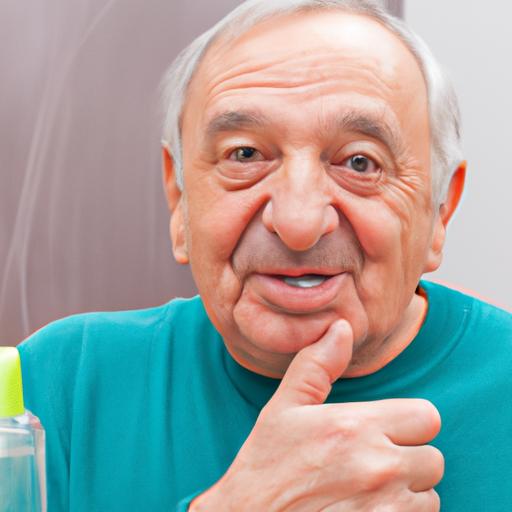
Discover the benefits of using Mouthwash for elderly individuals to promote oral health. Learn how to choose the right mouthwash and use it effectively.
As we age, maintaining good oral health becomes increasingly important. Older adults are more prone to dental issues and oral diseases, making it crucial to establish a robust oral hygiene routine. One essential component of this routine is the use of mouthwash for the elderly. In this article, we will explore the benefits of using mouthwash, considerations when choosing the right product, proper usage techniques, and more, all aimed at helping seniors maintain optimal oral health.

Using mouthwash can improve oral health and boost confidence in seniors
Benefits of Using Mouthwash for the Elderly
Reducing Plaque and Bacteria: The Key to Dental Health
Plaque buildup is a common issue among the elderly and can lead to various dental problems, such as cavities and gum disease. Effectively controlling plaque is crucial for maintaining oral health. This is where mouthwash for the elderly comes into play. By incorporating mouthwash into your daily routine, you can significantly reduce plaque accumulation and bacteria in your mouth, mitigating the risks associated with dental issues.
Preventing Gum Diseases: the Silent Destroyers
Gum diseases, such as gingivitis and periodontitis, can wreak havoc on oral health, leading to tooth loss and other complications. The elderly are particularly susceptible to these conditions due to age-related factors and potential underlying health issues. However, using mouthwash formulated for their needs can help prevent gum diseases and promote healthier gums.
Fresh Breath and Improved Taste Sensation: A Boost for Confidence
As we age, changes in taste perception and the onset of conditions like dry mouth can diminish the enjoyment of food and beverages. Fortunately, certain mouthwashes are designed to enhance taste perception and freshen breath. Incorporating such mouthwash into your daily routine can help seniors regain their confidence in social situations and fully savor the flavors of their favorite meals.
Considerations When Choosing a Mouthwash for the Elderly
Alcohol-Free Mouthwash: A Gentle Yet Effective Option
When selecting a mouthwash for the elderly, it is crucial to opt for an alcohol-free formulation. Alcohol can cause dryness and irritation, which may exacerbate existing oral health issues. Alcohol-free mouthwashes, on the other hand, provide effective benefits without the potential negative side effects, making them an optimal choice for seniors.
Key Ingredients for Optimal Oral Health
To ensure the mouthwash you choose is effective in promoting oral health, it’s important to consider the ingredients. Look for mouthwashes that contain antimicrobial agents, such as chlorhexidine or cetylpyridinium chloride, as these help eliminate harmful bacteria. Additionally, fluoride is essential for preventing tooth decay and strengthening teeth, making it a valuable ingredient to prioritize.

Recommendations for Sensitive Teeth and Dry Mouth
Seniors with sensitive teeth or dry mouth require special consideration when choosing a mouthwash. Fortunately, there are mouthwash options available that cater specifically to these needs. Look for mouthwashes formulated for sensitive teeth, which typically contain desensitizing agents to alleviate discomfort. For individuals with dry mouth, mouthwashes with moisturizing and hydrating properties can provide much-needed relief.
How to Properly Use Mouthwash for the Elderly
Step-by-Step Guide for Optimal Results
Using mouthwash correctly is crucial to reap its full benefits. Follow these simple steps to ensure you are using mouthwash effectively:
- Pour the recommended amount of mouthwash into a cup or the cap of the bottle.
- Take a small sip and swish the mouthwash around your mouth for 30-60 seconds.
- During rinsing, make sure the mouthwash reaches all areas of your mouth, including the gums and back of the tongue.
- Spit out the mouthwash thoroughly, avoiding swallowing.
- Avoid eating or drinking for at least 30 minutes after using mouthwash to allow its active ingredients to work their magic.
Precautions and Potential Side Effects
While mouthwash is generally safe for most individuals, it is essential to be aware of potential side effects and take necessary precautions. Some individuals may experience allergic reactions or sensitivities to certain ingredients in mouthwash. If you notice any adverse effects, discontinue use and consult a dentist or healthcare professional for guidance.
Conclusion: Prioritizing Oral Health for a Better Quality of Life
In conclusion, incorporating mouthwash into the daily oral hygiene routine of the elderly can significantly contribute to their overall oral health and well-being. From reducing plaque and preventing gum diseases to boosting taste sensation and freshening breath, the benefits are undeniable. When choosing a mouthwash, opt for alcohol-free options and pay attention to key ingredients suitable for the specific needs of seniors. By using mouthwash correctly and seeking professional guidance when needed, seniors can enjoy the many advantages that mouthwash brings, helping them maintain optimal oral health and enjoy a better quality of life.
Remember, maintaining good oral health is crucial for overall well-being, and mouthwash for the elderly is an invaluable tool in achieving this goal. So why wait? Start incorporating mouthwash into your daily routine and experience the positive impact it can have on your oral health. For more information on oral hygiene products, including mouthwashes, visit Best Water Flosser HQ.





